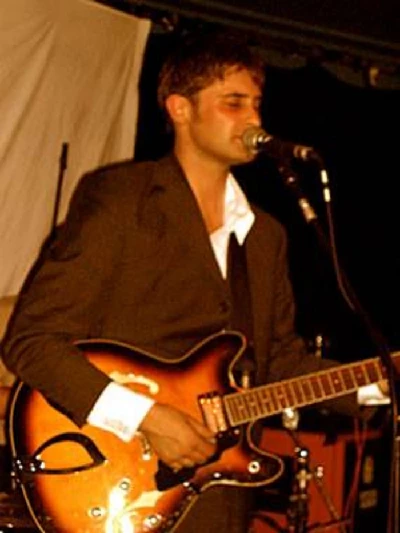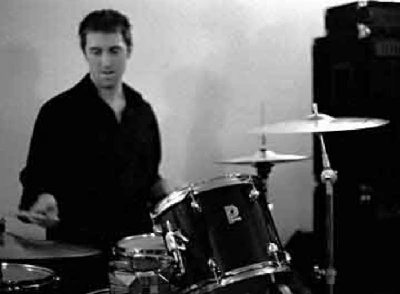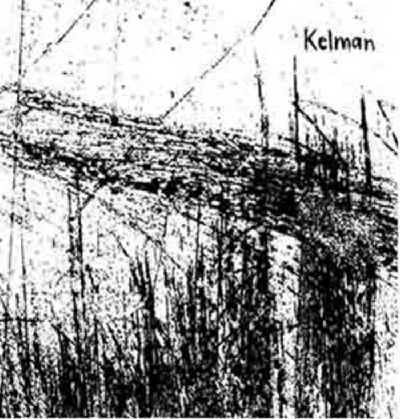published: 8 /
3 /
2004

After the collapse of their indie guitar band Baptiste last year, brothers Wayne and Marc Gooderham have formed a new band, Kelman. Wayne Gooderham talks to john Clarkson about his new starker change of direction
Article
This is a story of new beginnings and of brotherly loyalty. It is also the story of a great lost band.
During their six year lifespan, the West London independent guitar band Baptiste never met with much in the way of luck. While the group’s core trio of Wayne Gooderham (rhythm guitar and vocals), his younger brother Marc (drums) and their friend Colin Moors (lead guitar) remained unchanged, they had a lot of early trouble finding a regular bassist. It was not until mid 2000, three years after they first formed, when they decided to expand Baptiste from a four-piece band into a five-piece and added New Zealander Scott Brodie (bass) and Chris Ayles (keyboards) that the line-up finally stabilised. More problems, however, ensued. Both Wayne Gooderham and Moors lost their jobs, and Marc Gooderham broke his hand, delaying their debut album, ‘Nothing Shines Like a Dying Heart’, which did not finally come out until late 2002. By then it was nearly over. Internal friction had, however, started to develop in the band and Colin Moors left the group in March 2003. A day later Brodie and Ayles also decided to quit and Baptiste came to an end.
Throughout their time together, Baptiste always remained something of an unknown force, even in their native city. Perhaps part of the reason for this lay in their decision to release their records through their own record label, Linear, so that they could maintain complete creative control of their work. Although such gestures are noble, they rarely constitute in wide audiences or record sales. Websites such as this one, and Losing Today http://www.losingtoday.com and Popnews http://www.popnews.com
raved about Baptiste, finding favourable comparisions in their feedback-strewn sound and songwriter Wayne Gooderham’s poetically melancholic lyrics with the likes of the Jesus and Mary Chain, the Go Betweens and the Velvet Underground. Without the clout of an established label behind them, they were, however, never picked up upon by the mainstream music press at large, and, other than the occasional fanzine with a small circulation, never received a printed review or interview. For those who cared they left behind a legacy of just 15 recorded songs : three limited-to-500 copies vinyl singles, ‘A New Career in a New Town’ (1999), ‘The Quiet Times’ (2000) and ‘Kissing With Your Eyes Open’ (2001) ; their B-sides ; the eight tracks of the album, and one other song ‘Postcards’, which was released on ‘Sunset : False’, a compilation on a short-lived and obscure label, Slow Noir.
“It did come as a shock to me when Baptiste split up” admits Wayne Gooderham, talking to Pennyblackmusic in the bar of London’s Spitz venue in his first interview since they broke up. “I was really, really surprised. I had written some new songs, and we had begun working towards a second album. I think if ‘Nothing Shines Like a Dying Heart’ had taken off and we had had reviews in the monthlies we would probably still be together today. It is probably a bit idealistic, but to me that shouldn’t be what it is about. You just carry on. It seems like a waste to put all that effort into something and not to see it reach its conclusion. Some of the other members of the band, however, didn’t agree. Not everyone lost interest, but three fifths of the band did.”
Baptiste initially briefly planned to stay together long enough to release a final farewell EP of previously unrecorded songs, but Wayne Gooderham, rather than continue to play with what he now saw as a " dead band", decided instead to break up Baptiste and the group finished, after playing a last show at the London Underworld, less than a fortnight after Moors, Brodie and Ayles announced that they were going to leave. For a short whil Gooderham, who is an English Literature graduate, planned to abandon music so that he could concentrate on his other creative interest in writing stories. He was, however, talked into reconsidering by his brother.
“Originally I planned not to do a band and just to do some writing” he recalls. “Marc, however, is very enthusiastic, and persuaded me to change my mind. We both felt that things were unfinished, and Marc said that we had to carry on. He persuaded me to keep going and to start a new group.”
The Gooderhams decided to name their band Kelman in tribute to one of Wayne Gooderham’s favourite authors, the Booker-prize winning Glaswegian writer, James Kelman.
By the time of their break-up, Baptiste’s sound had become increasingly deluxe. Few of the songs on ‘Nothing Shines Like a Dying Heart’ last less than five minutes, and some are extended out over the course of eight and nine minutes. The Gooderhams decided, however, to strip Kelman back to basics. While Wayne Gooderham remains on vocals and playing electric guitar, Marc now plays with a pared-down drum kit. The only addition to the line-up is a cellist, and the length of Kelman’s songs have similarly been curtailed, few stretching out beyond three minutes.
The Gooderhams wanted to rend everything down both so that they could lay the ashes of Baptiste firmly to rest, and also so that, rather than simply regurgitate the past, they could find a new direction. They made a conscious decision, post Baptiste, that they wanted to depend on themselves as much as possible in the future.
“Baptiste were in many ways quite a simple band” says Gooderham. “The songs were simple. I don’t think they were complicated. We did pitch things more and more sonically. Soundwise there was a bit more noise, but the actual songs, when you stripped them apart, they were just two or three chords and that was it. The Velvet Underground’s ‘Live 1969’ album was a major blueprint for Baptiste. If you have got a band who can get into a groove, you usually end up with good dynamics. Baptiste were good at dynamics.”
“The blueprint for Kelman is just to keep things basic” he continues. “And to get rid of everything unnecessary and to make it almost like a folk act. The cello is there because I wouldn’t be able to carry the songs through on my own with just a guitar, whereas the cello can play lead guitar parts or whatever and it can play other melodies which a lead guitar can’t do.”
“We spent a lot of time working on getting the sounds right for the songs with Baptiste. Now, when I have written them on the guitar, that’s basically how they sound. We just flesh them out with the cello.”
Kelman recently recorded a three track demo, which consists of a reworking of ‘A New Career in a New Town’, Wayne Gooderham’s personal favourite of his own compositions, and also two new songs, ‘Shut A Final Door’ and ‘Untitled’. The searing, racing cello of Jane Cockcroft, who plays on the recording, is pitted against Wayne’s shimmering guitar and Marc’s fluttering, light drum work. The whole demo, not just in its sound, but also with its lyrics, is suggestive of a rebirth, and implies that a permanent seal is being put on matters. ‘Shut a Final Door’ finds Wayne Gooderham raising “a glass to lost friends” On ‘Untitled’ he watches with world-worn resignation his “kingdom collapse”, but then in a moment of defiance claims also that he “can claw it back” whenever he wants.
“It is true that I tend to write from my own experience” Gooderham reflects when questioned about this. “It is not that varied what I get up to. I can often see where things are heading, and , if three songs are written around the same time, the same theme can often crop up quite a bit.”
“ ‘A New Career in a New Town’, having said that though, was obviously written years and years ago, and it is only ‘Untitled’ that was written after Baptiste broke up. That song is more about what you give up in a relationship for someone, while knowing that the old life is still there if you want it. I suppose though that it is about Baptiste as well. ‘
“Shut a Final Door’ was was one of the songs we were working on and going to record when Baptsiste split, and was about something else entirely. I was going through a crisis and it was written then. It’s funny though. You can write about something and it can often take on a completely different meaning after you have written it.”
Kelman now have enough material to record an eight or nine song album. Rather than resurrect Linear, however, the Gooderhams are now looking for a record deal.
“We would really just like someone to give us enough money to go into the studio for a day or two to bang out an album” concludes Gooderham, talking about Kelman’s plans for the future. “The songs are not difficult and very simple, so I think we could record them in that time length.”
“I do think if we had had the right people with Baptiste behind us we could have done a lot better than we did. By right people, I don’t mean management. Our manager, Anthony Brady, was really good and couldn’t have done anymore. I am talking about if we had a record deal and someone to promote us properly and if we had had the press. Despite the way it ended and the way nothing went right I remain immensely proud of the singles, and the album I feel is great.”
“Now that we have done an album already with Baptiste, we know that getting an album out with Kelman is do-able. All our expectations are with Kelman is to get the album out and to then to see what happens really.”
The music industry, of course, remains as unpredictable in its whims and affiliations. Both Wayne and Marc Gooderham are long overdue more recognition than they have had in the past. Hopefully they will with Kelman meet better fortune.
More information about Kelman can be found at http://www.kelmanband.com
Picture Gallery:-

